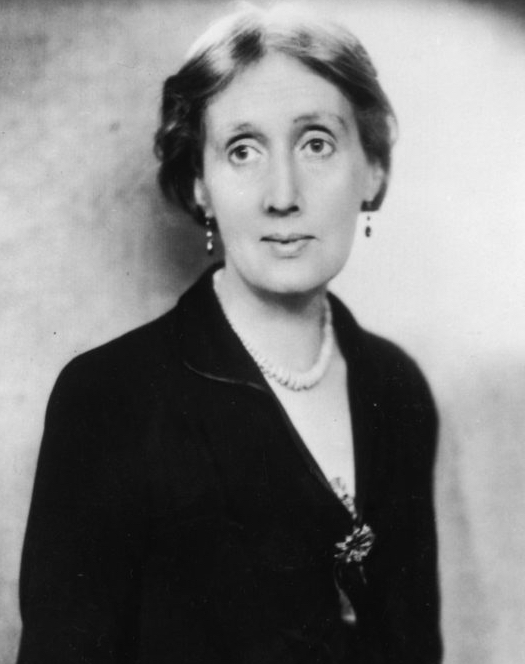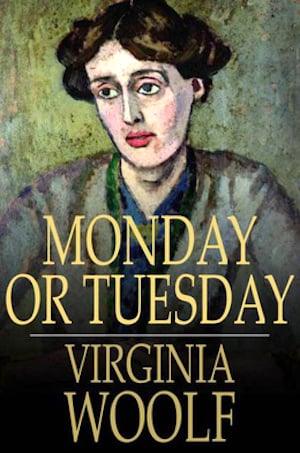“A Haunted House” by Virginia Woolf (full text)
By Nava Atlas | On July 18, 2020 | Updated May 1, 2025 | Comments (0)

“A Haunted House” by Virginia Woolf (1882 – 1941) was published in her first collection of short fiction, Monday or Tuesday (1921). It later appeared as the lead story of another collection of stories, A Haunted House and Other Short Stories (1944), after Woolf’s death.
Presented here is the text in full. First, here are links to a pair of analyses of this classic short story:
“‘A Haunted House’ by Virginia Woolf both is and is not a ghost story. In less than two pages of prose, Woolf explores, summons, and subverts the conventions of the ghost story, offering a modernist take on the genre … In summary, the narrator describes the house where she and her partner live.
Whenever you wake in the house, you hear noises: a door shutting, and the sound of a ‘ghostly couple’ wandering from room to room in the house.”
“In ‘A Haunted House’ we have the themes of struggle, loss, commitment, connection, love, and acceptance … The story is narrated in the first person by an unnamed female narrator and after reading the story the reader realises that Woolf may be exploring the theme of struggle.
Both the deceased man and woman are searching for something (love) yet they cannot find what they are looking for at the beginning of the story.”
. . . . . . . . . . .

Learn more about Virginia Woolf
. . . . . . . . . . .
From the Foreword by Leonard Woolf
Monday or Tuesday, the only book of short stories by Virginia Woolf which appeared in her lifetime, was published in 1921. It has been out of print for years.
All through her life, Virginia Woolf used at intervals to write short stories. It was her custom, whenever an idea for one occurred to her, to sketch it out in a very rough form and then to put it away in a drawer.
Later, if an editor asked her for a short story, and she felt in the mood to write one (which was not frequent), she would take a sketch out of her drawer and rewrite it, sometimes a great many times.
Or if she felt, as she often did, while writing a novel that she required to rest her mind by working at something else for a time, she would either write a critical essay or work upon one of her sketches for short stories.
Finally, in 1940, she decided that she would get together a new volume of such stories and include in it most of the stories which had appeared originally in Monday or Tuesday, as well as some published subsequently in magazines and some unpublished. Our idea was that she should produce a volume of critical essays in 1941 and the volume of stories in 1942.
In the present volume I have tried to carry out her intention. I have included in it six out of the eight stories or sketches which originally appeared in Monday or Tuesday. The two omitted by me are “A Society,” and “Blue and Green.” I know that she had decided not to include the first and I am practically certain that she would not have included the second.
. . . . . . . . . .

You might also like reading the full texts of:
“Kew Gardens”
“Monday or Tuesday”
. . . . . . . . . .
A Haunted House by Virginia Woolf (1921)
Whatever hour you woke there was a door shutting. From room to room they went, hand in hand, lifting here, opening there, making sure—a ghostly couple.
“Here we left it,” she said. And he added, “Oh, but here too!” “It’s upstairs,” she murmured. “And in the garden,” he whispered “Quietly,” they said, “or we shall wake them.”
But it wasn’t that you woke us. Oh, no. “They’re looking for it; they’re drawing the curtain,” one might say, and so read on a page or two.
“Now they’ve found it,” one would be certain, stopping the pencil on the margin. And then, tired of reading, one might rise and see for oneself, the house all empty, the doors standing open, only the wood pigeons bubbling with content and the hum of the threshing machine sounding from the farm.
“What did I come in here for? What did I want to find?” My hands were empty. “Perhaps it’s upstairs then?” The apples were in the loft. And so down again, the garden still as ever, only the book had slipped into the grass.
But they had found it in the drawing room. Not that one could ever see them. The window panes reflected apples, reflected roses; all the leaves were green in the glass. If they moved in the drawing room, the apple only turned its yellow side.
Yet, the moment after, if the door was opened, spread about the floor, hung upon the walls, pendant from the ceiling—what? My hands were empty. The shadow of a thrush crossed the carpet; from the deepest wells of silence the wood pigeon drew its bubble of sound.
“Safe, safe, safe,” the pulse of the house beat softly. “The treasure buried; the room…” the pulse stopped short. Oh, was that the buried treasure?
A moment later the light had faded. Out in the garden then? But the trees spun darkness for a wandering beam of sun. So fine, so rare, coolly sunk beneath the surface the beam I sought always burnt behind the glass.
Death was the glass; death was between us; coming to the woman first, hundreds of years ago, leaving the house, sealing all the windows; the rooms were darkened. He left it, left her, went North, went East, saw the stars turned in the Southern sky; sought the house, found it dropped beneath the Downs. “Safe, safe, safe,” the pulse of the house beat gladly. “The Treasure yours.”
The wind roars up the avenue. Trees stoop and bend this way and that. Moonbeams splash and spill wildly in the rain. But the beam of the lamp falls straight from the window.
The candle burns stiff and still. Wandering through the house, opening the windows, whispering not to wake us, the ghostly couple seek their joy.
“Here we slept,” she says. And he adds, “Kisses without number.” “Waking in the morning—” “Silver between the trees —” “Upstairs—” “In the garden—” “When summer came—” “In winter snowtime—” The doors go shutting far in the distance, gently knocking like the pulse of a heart.
Nearer they come; cease at the doorway. The wind falls, the rain slides silver down the glass. Our eyes darken; we hear no steps beside us; we see no lady spread her ghostly cloak. His hands shield the lantern. “Look,” he breathes. “Sound asleep. Love upon their lips.”
Stooping, holding their silver lamp above us, long they look and deeply. Long they pause. The wind drives straightly; the flame stoops slightly. Wild beams of moonlight cross both floor and wall, and, meeting, stain the faces bent; the faces pondering; the faces that search the sleepers and seek their hidden joy.
“Safe, safe, safe,” the heart of the house beats proudly. “Long years—” he sighs. “Again you found me.” “Here,” she murmurs, “sleeping; in the garden reading; laughing, rolling apples in the loft. Here we left our treasure—”
Stooping, their light lifts the lids upon my eyes. “Safe! safe! safe!” the pulse of the house beats wildly. Waking, I cry “Oh, is this your buried treasure? The light in the heart.”
More about Monday or Tuesday by Virginia Woolf
- Listen online at Librivox
- Monday or Tuesday at the British Library
- Read the entire collection of Monday or Tuesday on Project Gutenberg
Leave a Reply